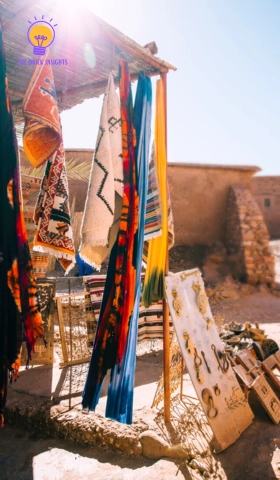When one encounters the term ‘Rohi’ one may get curious regarding this word. It is a term that has multi cultural and lingual aspects to it. It is a term that also has more meaning than just a word. In this piece, we will discuss the term “Rohi”, its origin and its present-day use.
Understanding Rohi Meaning

The word “Rohi” has different meanings in different languages and according to different contexts. In Urdu language, word “Rohi” is the name of a wasteland in particular the cholistan desert of Pakistan. ‘Rohi’ is also the name of such types of barren lands which are inhabited by diverse forms of culture and history. The term “Rohi” is also a borrowed word which prevails in the dialect of the people and is indicative of the strong and harsh character of this region.
Other languages, even such as hebrew do use this word, especially ‘Rohi’ has significance there too. In Hebrew ‘Rohi’ is rooted in ‘hoe’ which means ‘shepherd’ or ‘one who leads’. It is highly reported in the religious literature where God is depicted as the said above ‘Rohi’, the one who leads or guides his people. It addresses a lot of meanings filled with care and guardianship about God’s and His people’s relationship.
Rohi in Cultural and Religious Contexts
The meaning of the word “Roh” changes according to one’s environment or culture. In the Cholistan Desert, “Rohi” recalls the life and ways of the people this region is home to. The Cholistan Desert, also called as ‘Rohi’, is not merely a parched and sandy landscape but a depiction of endurance and resilience. The inhabitants of this area referred to as the Rohilas, have adapted to adverse environments. They have a rich culture that is characterized by varied customs, songs and folklore which is passed down from one generation to the next.

In Hebrew society, “Rohi” connotes a “pastoralist” with a significant religious undertone. This word is commonly used in prayers and religious scriptures when referring to God, who is the Shepherd. In the same way, a shepherd guides and protects his sheep it is implied by the word “Rohi” that God’s relationship with his followers has God at the center, leading His people. It demonstrates how God supports those who are devoted to Him and protects them.
The Historical Significance of Rohi

The Cholistan Desert, or Rohi, has existed for thousands of years long before it was ever called by that name. This region was once part of the Indus Valley Civilization, one of the oldest and advanced civilizations in history. The ruins of old cities in the desert of Rohi provide evidence of great and well-planned polity which once existed in this desert area.
Rohi has been long retained as a name for the area and so it is firmly imbedded with the people of this region. This is considered to be the original name of the region. The people of the region have preserved their ancestors’ rituals through the use of music, arts, and crafts. Such activities sustain hope of life in the desert.
In the context of the Hebrew religion, the name “Rohi” has been in use for thousands of years. A god with such characteristics has been addressed in many religious texts including the Bible. It represents God’s guidance as a source of encouragement and comfort for all followers throughout the centuries.
Rohi in Modern Usage
Even in the present era, “Rohi” has a number of variants, each conveying important meanings. In Pakistan, even today it is known as Rohi with reference to the Cholistan Desert which has a cultural importance. Visitors travel to Rohi to appreciate the sceneries of the region and the area people and their way of life.
In Modern Hebrew, `Rohi’ continues to carry the religious connotation intersected with pastoral meaning. It is found in the context of prayers, worship songs and in religion-related education as letting the followers know that there is always guidance from above. The word has also managed to make its way into modern-day metaphysics, where practitioners are looking for leaders in their lives and direction.
FAQs
What can one understand about ‘Rohi’ from Urdu language?
According to Urdu “Rohi” speaks to the Cholistan Desert- which is one of the very dry regions in Pakistan. This term of expression brings to mind the image of the beauty of the desert terrain.
What is the reference of ‘Rohi’ in Hebrew?
“Rohi” means ‘shepherd’ or ‘one who leads’ in Hebrew which is widely used in a religious manner to refer to God as a Shepherd who takes care of and leads His people.
Is ‘Rohi’ merely a word or does it have ethnical connotation?
‘Rohi’ is a word with a lot of cultural and historical significance. In Pakistan it depicts the Cholistan Desert and its cultural richness. In Hebrew, it has strong uncultured interprets associated with leading and guarding.
How has ‘Rohi’ been utilized and applied in today’s society?
Currently, the word is still in usage when referring to the Cholistan Desert where it’s situated in Pakistan.
Conclusion
The term “Rohi” arises in many contexts. It’s not a one-word affair.
For the Cholistan Desert inhabitants, “Rohi” is crucial because it is a demonstration of their strength and courage as well as their devotion to their land.
In the Hebrew tongue, the term “Rohi” can be roughly translated to “a leader or guide” and in this connection, one can see the relationship between the word and religion and history.
In all several rohi meaning, they unite various cultures and ideas. There’s more to it that explains the phenomenon of words having meaning attached to them.
Therefore, whenever the next occasion comes when you think of the term “Rohi”, you will know it is beyond language. It is a narrative about people, places and faiths.
Enhancing vocabulary with “Rohi” helps broaden the outlook at words. One learns that words are fragments of history. Yes, “Rohi” as a word may have originated a long time ago, but in ignores its relevance even today.



